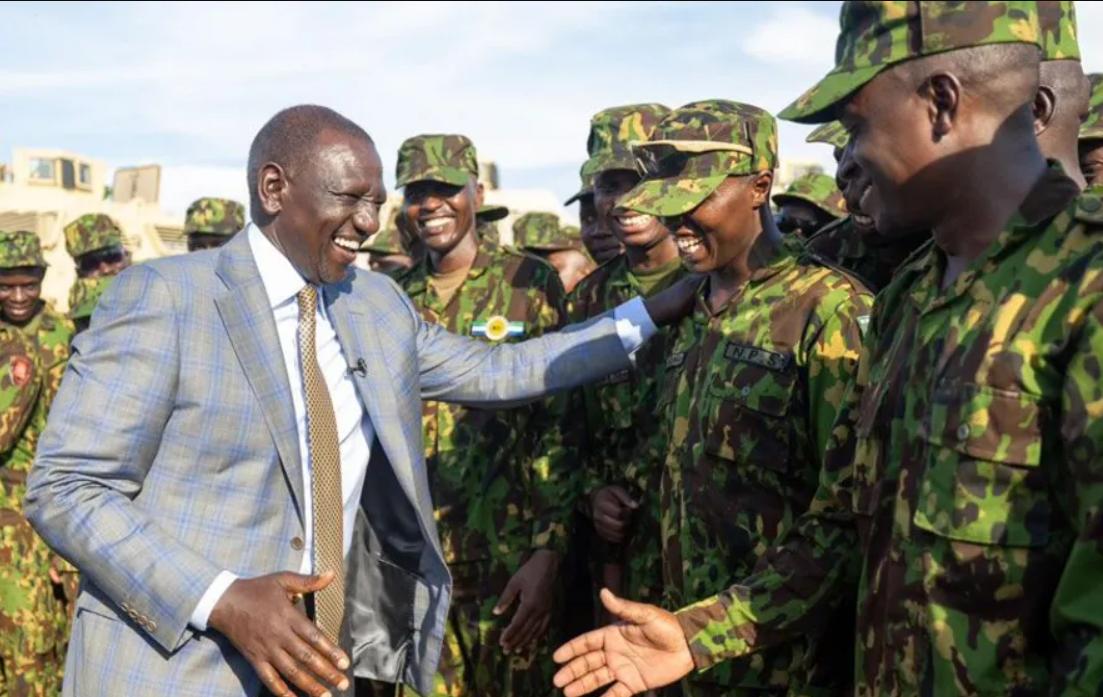In response to the gang violence that has engulfed most of Port-au-Prince and the neighboring regions, Kenya has promised to bolster its security operation in Haiti by sending 600 more police officers to help fight the crime. The announcement shows that Kenya is getting more involved in helping the Caribbean nation stabilize itself, which has been dealing with political unrest and gang violence. The most recent deployment is a major step toward the possibility of creating a full-scale United Nations peacekeeping force in Haiti and is anticipated to strengthen security measures.
The Greater Purpose and the Kenyan Contingent
June marked the beginning of Kenya’s engagement in Haiti when the country’s first contingent of police personnel was dispatched to assist Haiti’s overburdened police forces. There will now be a thousand Kenyans in the country thanks to the additional deployment, which will strengthen current attempts to restore order. The United Nations Security Council initially authorized the broader mission in October 2023 as part of the Multinational Security Support (MSS) operation.
The MSS has received pledges of cooperation from at least 1,900 extra officers, and multiple nations have promised to send more troops. Despite their importance, these endeavors are encountering obstacles as a result of insufficient funding and tools.
The Mission’s Dedication to President Ruto
William Ruto, president of Kenya, has consistently voiced his support for the Haitian mission. Ruto complimented the Kenyan police on their accomplishments thus far during his visit to Haiti. He said that many people had believed stabilizing Haiti would be an impossible endeavor, and he admitted that there had been initial doubts about the mission. But Ruto was sure the expedition would be successful in its battle against gangs, and he promised to get better gear for the Kenyan police forces already on the field.
Within weeks, the president’s next 600 officers will be mission-ready, since they are currently training for deployment. Maintaining assistance to Haitian forces in their efforts to restore law and order and safeguard the public is their top priority.
Obstacles Encountered During the Mission
Major challenges persist despite advances. Armed factions in Haiti have taken over huge swaths of the capital and are actively seeking out new territory to dominate, leading to an increase in gang violence. The gangs’ confidence has grown as a result of the worldwide arms embargo, which has only partially succeeded in limiting the illicit import of weaponry into the nation.
William O’Neil, a human rights expert for the United Nations, recently published a study that emphasized the urgent need for more funding. Helicopters, drones, and night vision goggles are crucial instruments that the MSS mission is severely lacking, as pointed out by O’Neil. These flaws make the mission less effective overall, but they really show themselves when it comes to fighting the gangs’ growing power in rural and urban regions.
O’Neil further noted that gang-related violence has forced almost 700,000 people from their homes and that there has been a disturbing uptick in sexual violence. He demanded swift action to “stifle the gangs” by providing the MSS mission with the resources it needed to handle these humanitarian challenges, emphasizing the seriousness of the matter.
Proposal for an Expanded United Nations Peacekeeping Force
An additional twelve months of Kenya’s mission in Haiti will be up for discussion at the next meeting of the United Nations Security Council. The present operation will be able to transform into a full-fledged UN peacekeeping deployment by 2025, thanks to the decision. This change, if authorized, will enhance the mission’s capacity to confront the persistent violence by bringing more resources and logistical support.
In order to help the Haitian National Police and stop the growth of gang areas, the United Nations should send a comprehensive peacekeeping mission to the country. The targeted weapons embargo and sanctions regime, which aim to undercut the gangs’ stronghold, could be put into action along with other important measures recommended by the UN Security Council if this were to happen.
The Reaction in Haiti and Worldwide Worries
The delayed development of the mission is causing increasing discontent within Haiti, even as international support has grown. People are still being forced to leave their homes and communities because security authorities have not taken a strong enough stand against the gangs, according to critics.
Particularly bad is the situation in areas like Jérémie where the police just do not have the resources to fight the gangs. An officer from Haiti put it this way: it’s “bordering on the impossible,” highlighting the enormous difficulties encountered by local law enforcement due to a lack of resources.
There must be global collaboration to end the violence, as the United Nations has called for “redoubled efforts” to achieve. The increasing prevalence of sexual violence and the resulting mass displacement constitute a pressing humanitarian catastrophe that must be addressed immediately on a worldwide scale.
In summary
The stability of Haiti will be greatly aided by Kenya’s decision to increase its security deployment there. The mission’s goal is to restore security to areas afflicted by gang violence and assist Haitian forces in their fight against it. More police personnel will be deployed to support this effort. However there are still obstacles; for example, the mission is worried about the expansion of gang-controlled areas and is low on resources. The prospect of a complete peacekeeping operation provides cause for optimism as the United Nations Security Council gets ready to convene; it might lead to more international backing and a stronger attempt to tackle the worsening problem in Haiti.


















